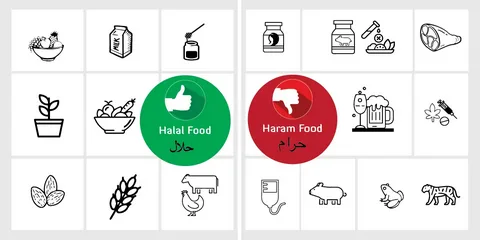In a world rich with diverse cultures and traditions, the concept of “Haram foods” holds significant importance. This article aims to delve into the intricacies of Haram foods, exploring their definition, cultural and religious significance, and the impact on dietary choices. Understanding the categories of prohibited foods, the reasoning behind dietary laws, and the broader context of health implications is essential for fostering awareness and respect for diverse culinary practices.
Categories of Haram Foods

- Pork and its Products
- Examining the prohibition of pork in various cultures.
- Understanding the historical context of avoiding pork consumption.
- Carnivorous Animals
- Exploring the prohibition of certain animal products.
- Addressing misconceptions surrounding the consumption of specific meats.
- Blood and its Byproducts
- Analyzing the religious and health-related reasons for avoiding blood consumption.
- Highlighting alternatives in cooking and food preparation.
- Alcohol and Intoxicants
- Discussing the impact of alcohol on physical and mental health.
- Navigating social situations where alcohol is prevalent.
Recommend: how to memorize quran in 1 year
Understanding Dietary Laws
- Islamic Dietary Restrictions
- Unpacking the foundations of Islamic dietary guidelines.
- Recognizing the spiritual significance of adhering to dietary laws.
- Prohibited Practices
- Examining practices that render food haram.
- Identifying common misconceptions about what constitutes prohibited practices.
- Reasons behind Dietary Guidelines
- Exploring the cultural and spiritual reasons behind avoiding specific foods.
- Emphasizing the role of dietary guidelines in promoting overall well-being.
Cultural Perspectives
- Impact on Food Choices
- Investigating how cultural perspectives shape dietary choices.
- Discussing the influence of family and community on individuals’ food preferences.
- Traditional Alternatives
- Highlighting traditional dishes that adhere to dietary guidelines.
- Encouraging the preservation of cultural culinary practices.
- Respect for Dietary Differences
- Promoting mutual respect for diverse dietary choices.
- Fostering understanding between individuals with varied culinary backgrounds.
Read more: easy way to learn quran for beginners
Health Implications
- Physical Consequences
- Exploring the potential health risks associated with consuming haram foods.
- Providing insights into maintaining a balanced and healthy lifestyle.
- Mental and Spiritual Aspects
- Discussing the psychological impact of adhering to dietary restrictions.
- Recognizing the spiritual benefits of mindful food consumption.
- Balancing Dietary Choices
- Offering practical tips for balancing dietary restrictions and nutritional needs.
- Emphasizing the importance of moderation in all aspects of life.
- Practical Tips for Adherence
- Providing practical advice for individuals navigating a haram foods-free lifestyle.
- Offering suggestions for handling social situations with grace and confidence.
- Seeking Halal Alternatives
- Exploring the availability of halal alternatives in the modern food market.
- Encouraging the exploration of diverse and culturally rich cuisines.
- Raising Awareness and Education
- Emphasizing the importance of raising awareness about haram foods.
- Discussing the role of education in dispelling myths and fostering understanding.
Misconceptions
- Common Myths Surrounding Haram Foods
- Addressing prevalent misconceptions about specific foods being haram.
- Providing accurate information to dispel myths and misinformation.
- Clarifying Misinformation
- Analyzing the role of media and cultural stereotypes in perpetuating misinformation.
- Encouraging critical thinking and fact-checking in dietary discussions.
- Building Understanding
- Promoting open conversations to build understanding between individuals with different dietary practices.
- Encouraging empathy and respect in discussions about food choices.
Community and Support
- Importance of Community
- Discussing the role of community in supporting individuals with specific dietary restrictions.
- Highlighting the sense of belonging and understanding within like-minded communities.
- Support Systems in Place
- Identifying existing support systems for individuals navigating haram foods restrictions.
- Encouraging the establishment of supportive networks within communities.
- Encouraging Healthy Conversations
- Promoting healthy and constructive conversations about dietary choices.
- Providing tips for fostering understanding and tolerance within diverse communities.
Challenges Faced
- Social Pressures
- Addressing the challenges individuals face in social settings due to dietary restrictions.
- Offering strategies for confidently navigating social situations.
- Personal Struggles
- Recognizing the personal struggles individuals may face in adhering to haram foods guidelines.
- Encouraging self-care and seeking support when needed.
- Addressing Misunderstandings
- Discussing the importance of addressing misunderstandings about haram foods.
- Providing guidance on effective communication to dispel misconceptions.
Evolution of Dietary Practices
- Historical Context
- Tracing the historical evolution of dietary practices across cultures.
- Exploring the adaptability of culinary traditions over time.
- Modern Adaptations
- Examining how traditional dietary practices adapt to modern lifestyles.
- Celebrating the fusion of cultural cuisines in a globalized world.
- Embracing Change Responsibly
- Discussing the importance of embracing change in dietary practices responsibly.
- Balancing cultural preservation with the evolving preferences of individuals.
The Role of Personal Choice
- Balancing Cultural and Individual Preferences
- Encouraging individuals to strike a balance between cultural and personal food preferences.
- Recognizing the agency of individuals in shaping their dietary choices.
- Encouraging Respectful Discourse
- Advocating for respectful discussions about dietary choices.
- Promoting an environment where diverse perspectives are acknowledged and valued.
- Celebrating Diversity in Food Choices
- Celebrating the richness of global cuisine and diverse food choices.
- Encouraging a spirit of appreciation for the culinary tapestry of our world.
Impact on Global Cuisine
- Cultural Exchange and Culinary Diversity
- Exploring the positive impact of cultural exchange on global cuisine.
- Recognizing the role of diverse dietary practices in enriching culinary traditions.
- Fusion Cuisine Trends
- Highlighting the growing trend of fusion cuisines that blend diverse culinary elements.
- Encouraging exploration and appreciation of innovative food combinations.
- Mutual Respect in Food Practices
- Advocating for mutual respect in acknowledging and embracing different food practices.
- Celebrating the diversity that contributes to the global mosaic of culinary traditions.
Why Do Muslims Consume Halal Food?

In the rich tapestry of Islamic traditions, dietary choices play a profound role, with the concept of halal food holding paramount importance. Halal, meaning permissible in Arabic, extends beyond a mere set of guidelines; it represents a way of life deeply intertwined with spirituality and cultural identity.
Religious Commandments and Spiritual Purity
Islamic law, as articulated in the Quran, explicitly outlines the permissibility of certain foods and the prohibition of others. Halal food adheres to these divine commandments, ensuring that the consumption aligns with the principles of righteousness and purity.
Connection to Spiritual Practices
Consuming halal food is viewed as a way to maintain spiritual purity. Muslims believe that adhering to halal dietary guidelines enhances the connection between the individual and the divine, fostering a sense of consciousness and mindfulness in daily life.
Respect for Life and Ethical Treatment of Animals
One of the key tenets of halal consumption is the humane treatment of animals. Islamic principles mandate that animals be slaughtered in a humane and compassionate manner, emphasizing the significance of respecting all living beings.
Avoiding Cruelty and Unnecessary Harm
Halal practices discourage the consumption of meat obtained through cruel or inhumane methods. This ethical stance aligns with the broader Islamic teachings that emphasize compassion, mercy, and the avoidance of unnecessary harm to any living creature.
Submission to God’s Will
Consuming halal food is an act of submission to God’s will. By following the prescribed guidelines, individuals express their obedience and devotion to the divine commandments, reinforcing the spiritual discipline integral to Islam.
Incorporating Faith Into Daily Life
Halal consumption serves as a daily reminder of faith, integrating religious principles into the routine aspects of life. It reinforces the idea that one’s relationship with God extends beyond ritualistic practices to include even the most mundane activities like eating.
Learn Now: Learn Quran Online
FAQs
What are the main categories of Haram foods?
The main categories include pork and its products, carnivorous animals, blood and its byproducts, and alcohol.
How do dietary laws vary across different cultures?
Dietary laws vary significantly across cultures, reflecting religious beliefs, traditions, and regional customs.
Are there health benefits to following Haram foods guidelines?
Following haram foods guidelines may have physical, mental, and spiritual benefits, promoting overall well-being.
Practical tips include communication, seeking halal alternatives, and confidently navigating social settings.
What is the significance of personal choice in dietary practices?
Personal choice plays a crucial role in shaping dietary practices, allowing individuals to balance cultural and individual preferences.
Conclusion
In conclusion, the concept of haram foods extends beyond religious and cultural boundaries, influencing individual choices and global culinary landscapes. By fostering understanding, dispelling myths, and encouraging respectful discourse, we can create a world where diverse dietary practices are celebrated. Embracing change responsibly, while honoring cultural heritage, allows for a harmonious coexistence of culinary traditions.


